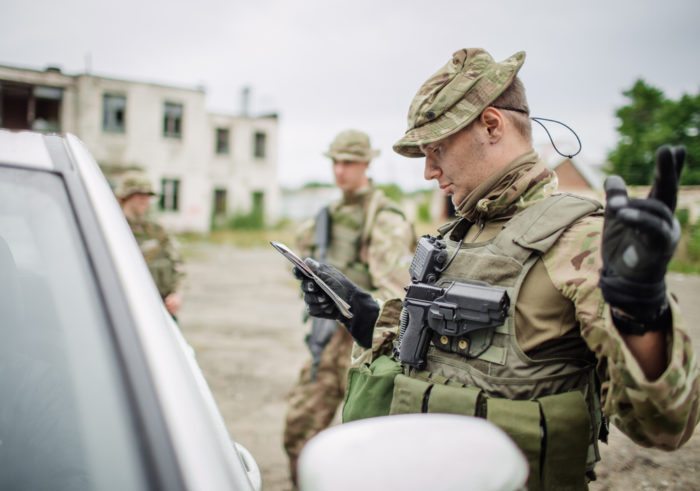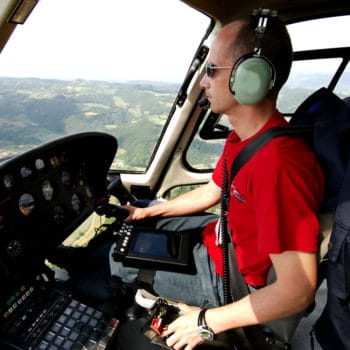Why We Love It
-
$79,620Potential Avg. Salary
-
-1.2%Job Growth Rate
-
Don't Take Work HomeCareer Attribute
-
Good Entry Level SalaryCareer Attribute
U.S. customs inspectors are law enforcement officials that enforce laws that govern entrance to the country and the importing and exporting of goods. U.S. customs inspectors serve as an important line of defense against terrorism and are employed by the Department of Homeland Security.
Recommended Schools
What is an U.S. Customs Inspector?
The following job responsibilities are common for individuals in U.S. customs inspector roles:
- Inspect passports, visas, and other required documentation of visitors to the U.S., and U.S. citizens returning from international travel
- Inspect visitors, cargo, and luggage to identify potential safety hazards or illegal substances
- Investigate suspicious activity and work with FBI agents or other law enforcement officials to detain and/or arrest dangerous suspects
A Day in the Life
A normal day for a U.S. customs inspector will depend somewhat on where he’s stationed. Customs officers may work at airports, seaports, and border crossing stations. One major responsibility of a U.S. customs agent is checking passports and visas of passengers on arriving, international flights or cruise ships. They may also inspect luggage to ensure that illegal items are not brought into the states. Additionally, they collect information from returning residents on purchases made internationally.
Other customs inspectors are responsible for monitoring and inspecting imported cargo. Cargo inspectors look for illegal or hazardous substances and may work with trained animals to assist with identification of possible illegal substances contained within imported goods. After inspection, U.S. customs inspectors sign off on shipments to allow them to enter the country for distribution.
Because work as a U.S. customs officer puts individuals in potentially high-risk situations, most are required to carry a firearm. They work both indoors and outdoors and may spend entire shifts on their feet and in inclement weather conditions. Additionally, customs officers stationed at drive-through border stations on the borders of Mexico and Canada may be required to inspect the vehicles of individuals crossing the border.
Typical Work Schedule
Most U.S. customs inspectors work full-time hours, but the shifts a customs officer is required to work may vary. Customs officers may work daytime, evening, and overnight hours and may be required to work weekends and holidays.
Projected Job Growth
Due to heightened national security in recent years, employment opportunities for U.S. customs officers is expected to grow in the coming decade.
Recommended Schools
How To Become an U.S. Customs Inspector
It’s possible to become a U.S. customs inspector with a high school diploma, though some more advanced positions may require a bachelor’s degree in a related field. Basic requirements for consideration include passing a thorough background check, being a U.S. citizen, and passing a drug test. Applicants that meet the basic requirements may then be required to pass several ability tests that measure physicality and reasoning skills—the ability to make sound judgements and good decisions.
If an applicant is successful in all of these tests, he/she may then be admitted to a training program that provides both educational and practical training on topics that are important for those working as U.S. customs officers. While in training, prospective customs officers will learn techniques for interviewing people to discern whether or not they’re telling the truth, how to spot suspicious behavior, how to handle and operate firearms, and legal regulations that impact day-to-day job responsibilities.
It’s possible that there will be a lot of competition for open U.S. customs inspector roles, so applicants with higher levels of education and more years of experience in related positions—such as law enforcement, military, or security officers—may be more likely to land positions than those with just a high school diploma and without relevant experience.
U.S. Customs Inspector Salary Data
We’ve provided you the following to learn more about this career. The salary and growth data on this page comes from recently published Bureau of Labor Statistics data while the recommendations and editorial content are based on our research.
National Anual Salary
Low Range
$53,810Average
$79,620High Range
$128,690National Hourly Wage
Low Range
$26/hrAverage
$38/hrHigh Range
$62/hrHow do U.S. Customs Inspector salaries stack up to other jobs across the country? Based on the latest jobs data nationwide, U.S. Customs Inspector's can make an average annual salary of $79,620, or $38 per hour. On the lower end, they can make $53,810 or $26 per hour, perhaps when just starting out or based on the state you live in.
Salary Rankings And Facts
#143 Nationally for All Careers
Above Average Salary Nationally
Programs and Degrees
Here are the most common degrees for becoming an U.S. Customs Inspector. a is usually recommended and specifically a degree or coursework that prepares you for the particular field, see below.
Highest Education Among U.S. Customs Inspectors
- 2.3% Doctorate
- 13.1% Masters
- 41.8% Bachelors
- 12.3% Associates
- 22.9% College
- 7.2% High School
- 0.4% Less than High School
Job Growth Projections and Forecast
2014 Total Jobs
116,7002024 Est. Jobs
115,300Job Growth Rate
-1.2%Est. New Jobs
-1,400How does U.S. Customs Inspector job growth stack up to other jobs across the country? By 2024, there will be a change of -1,400 jobs for a total of 115,300 people employed in the career nationwide. This is a -1.2% change in growth over the next ten years, giving the career a growth rate nationwide of Above Average.
Growth Rankings And Facts
#640 Nationally for All Careers
Above Avg. Growth Nationally
What Companies Employ The Most U.S. Customs Inspectors
| Industry | Current Jobs | New Jobs Needed | % Increase |
|---|---|---|---|
| Local government, excluding education and hospitals | 48,500 | 2,700 | 3% |
| Federal government, excluding postal service | 45,500 | -4,400 | -4% |
| State government, excluding education and hospitals | 21,300 | 400 | 0% |














